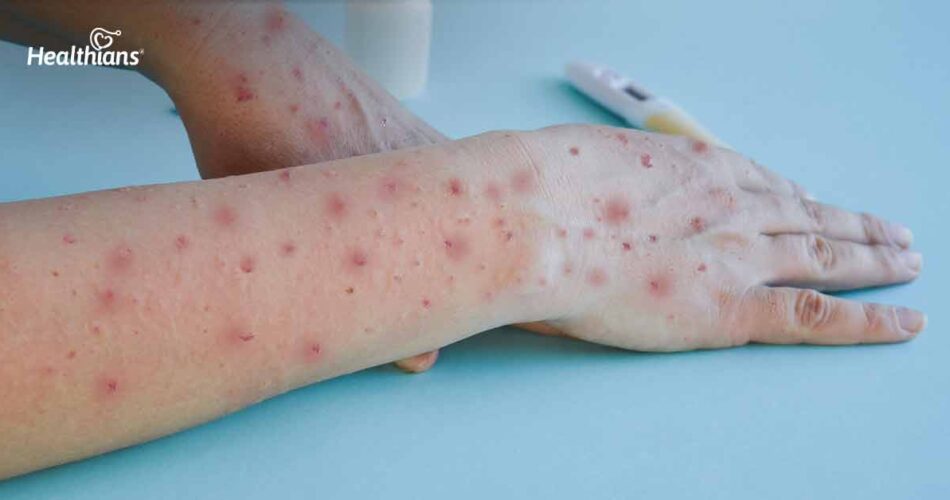Contributed by: Healthians Team
Introduction
Indian scientists and medical professionals are working nonstop to find a treatment for the recently discovered tomato flu.
A viral illness known as tomato flu or tomato fever has been noted in India since May 2022.
In the Kollam district of Kerala, the first incidence of the illness was reported. And as of now, Kerala, Tamil Nadu, and Odisha have each detected about 90 instances.
Children under 5 have been commonly affected by this uncommon sickness known as tomato flu.
The Lancet Respiratory Medicine states that there are no particular medications to treat tomato flu, which is infectious and self-limiting.
The virus that causes hand, foot, and mouth disease can have a new variation, but it is not fatal.
What is tomato flu
A rare viral illness called “tomato flu” is currently on the rise in India. A unique case of hand, mouth, and foot illness, this sickness is characterised by the appearance of painful blisters that are red and can grow to the size of tomatoes.
Intestinal viruses are responsible for this unusual illness. Due to adults’ typically stronger immune systems and metabolisms, children between the ages of 1 to 9 are more susceptible to tomato flu or tomato fever.
Symptoms of tomato flu
Medical professionals think that children’s dengue or chikungunya fever may evolve into tomato flu. According to accounts, the initial signs of tomato flu are the same as those of any other viral infection. such as:
- An abrupt rise in body temperature
- Terrible body aches
- Redness or rashes on the skin that itch constantly
- Stinging blisters
- Fatigue and lightheadedness
Other symptoms of tomato flu include severe mouth sores, rashes and itching on the hands, feet, and buttocks, swelling in the joints, nausea, and dehydration.
Due to similar symptoms, the tomato flu is sometimes mistaken for a coronavirus, although specialists have shown that this virus is unrelated to SARS-CoV-2.
Treatment for tomato flu
According to reports, tomato flu or fever is a self-limiting illness, meaning that it often resolves on its own, without the need for treatment.
As a result, there are no particular medications on the market that may be used to treat or cure the illness.
It is suggested to keep patients with the uncommon disease isolated since it is quickly transmitted from one person to another and is easily contagious.
Comparable to chikungunya or dengue, the main course of therapy for a patient with tomato flu or tomato fever is similar.
Patients are given a balanced meal and a lot of drinks to help them stay hydrated. Common medications like paracetamol or aspirin are recommended to reduce body temperature and relieve body aches.
It is recommended to exercise and focus on personal hygiene, including using a wet sponge to remove rashes and avoid scratching blisters or rashes.
Prevention of tomato flu
Controlling the spread of the tomato flu is the goal of preventative interventions.
Following are some simple techniques to stop the spread of the disease:
- Hygienic conditions and proper sanitation should be prioritised.
- While tomato flu seldom results in death, medical intervention is still necessary.
- In the event of an infection, isolation is essential.
- Children who are infected should avoid any social contact.
- It is best not to scratch rashes and blisters.
- Warm baths or showers should be given to children who are ill.
- Give a balanced diet and adequate rest for quick recovery.
Final thoughts
A person is determined to have tomato virus when molecular and serological testing rule out the possibility of viral diseases such as dengue, chikungunya, zika virus, varicella-zoster virus, and herpes.
Tomato flu is extremely infectious, much like other influenza strains, thus it is crucial to take all possible measures, particularly in terms of cleanliness and sanitization.
The tomato flu is a self-limiting illness, meaning it goes away on its own, whether or not a specific therapy is used.
There isn’t yet a specific medicine that can treat it. The therapy is identical to that for dengue, hand, foot, and mouth illness, chikungunya, and related symptoms.
It involves seclusion, relaxation, drinking a lot of fluids, and using a hot water sponge to soothe inflammation and rashes.
Furthermore, you should also undergo preventive health checkups. These health checks give a complete report about your health, allowing you to take necessary precautionary measures to improve your well-being and keep a host of ailments at bay.




